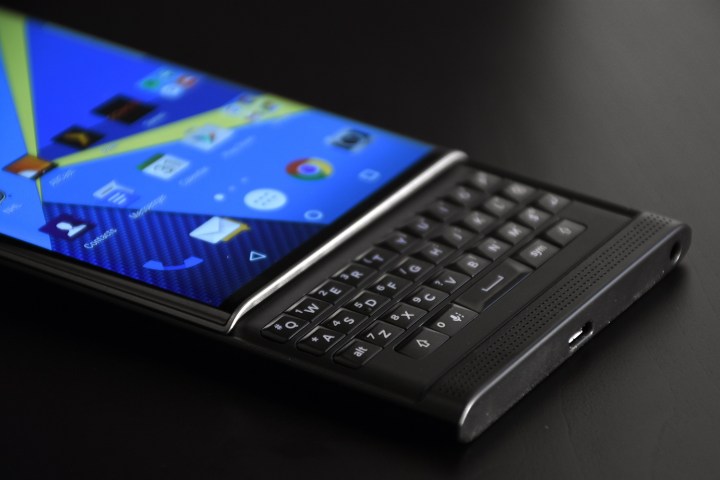
“The company plans to end all internal hardware development and will outsource that function to partners,” BlackBerry CEO John Chen said in a statement. “This allows us to reduce capital requirements and enhance return on invested capital.”
As part of the move away from first-party hardware, BlackBerry is discontinuing legacy devices that run BlackBerry 10 and has halted production of the BlackBerry Classic. The devices, including BlackBerry’s high-end, $700 Priv, were reported to have underperformed — the company sold an estimated 500,000 smartphones in the first quarter of 2016, a dip from the 2.1 million it sold in the same period a year ago.
In November 2015, Chen said BlackBerry’s hardware division would need to sell between three and five million smartphones to maintain profitability.
The shuttering of BlackBerry’s hardware will not come as much of a surprise to longtime observers. BlackBerry commands less than one percent of the global market and its hardware division, which accounts for more than 65 percent of the company’s research and development expenses, is perceived widely as a drag on internal resources. Wall Street analysts projected BlackBerry’s current course would have led to consecutive losses in 2017 and 2018.
It is not a death knell for BlackBerry phones, though. The enterprise behemoth will not be producing handsets itself, anymore, but pledged continue outsourcing the production of BlackBerry devices to third parties. The first product of such an arrangement, the DTEK50, was released in partnership with Alcatel parent company TCL Communications earlier in July.
If the DTEK50 is any indication, future BlackBerry phones will bear fewer of the hardware signatures by which the company became internationally recognized. The DTEK50, for instance, is a rebadge of an existing Android phone, the Alcatel Idol 4, and one of the few BlackBerry smartphones to lack the the company’s signature ergonomic keys. The firm’s patented chicklet keyboard, which has appeared in various incarnations on the company’s Bold, Curve, Tour and other phone series, came to generate a cult-like following — even spawning accessories that promised to approximate the experience on all-touchscreen devices like the iPhone.
BlackBerry is confident that its software will prove just as much a draw as its hardware, though. The DTEK50 ships with BlackBerry Hub, an aggregator of unread emails, instant messages, calendar notifications, frequent contacts, app notifications, and scheduled tasks, and packs DTEK, BlackBerry’s security solution that acts as a firewall against malware and alerts users to the presence of potentially dangerous applications and “other security problems.” And it sports software protection against common exploits and vulnerabilities, including Root of Trust, full disk encryption, and a secure bootloader — a confluence of measures which BlackBerry claims make the DTEK50 one of the “most secure” smartphones in the world.
But more broadly, BlackBerry is approaching the mobile market with platform agnosticism. Last month, the company’s Mobile Solutions Group launched BlackBerry Hub+, a premium subscription suite that provides unlimited, ad-free access to the company’s Password Keeper, Calendar, Notes, Tasks, and Device Search apps for a monthly fee. And earlier this year, it launched BlackBerry Radar, an IoT platform which provides “end-to-end asset tracking.”
Its efforts have been met with preliminary success. In 2015, the Mobile Solutions Group generated more than $500 million and during Tuesday’s earnings call, Chen said BlackBerry’s software and services business “remains on track” to deliver 30 percent revenue growth.
News of BlackBerry’s shifting strategy comes as the company reported revenues short of Wall Street’s projections. The company posted a $372 million year-over-year net loss for the second quarter, $147 million of which it attributed to restructuring. Revenue came to $334 million.
On a positive note, BlackBerry raised its earnings outlook for the year. Thanks in part to hardware downsizing, it expects a quarter between breakeven and five-cent-per-share loss, up from an earlier forecast of a 15-cent loss.
“We are reaching an inflection point with our strategy,” said Chen. “Our financial foundation is strong, and our pivot to software is taking hold.”
Editors' Recommendations
- This crazy case adds a BlackBerry-inspired keyboard to your iPhone
- BlackBerry trailer depicts the rise and fall of the iconic phone
- BlackBerry’s latest revival attempt crashes before launch
- The BlackBerry Key2 shows why software updates really matter
- A new BlackBerry with a keyboard is still on the schedule for 2022


